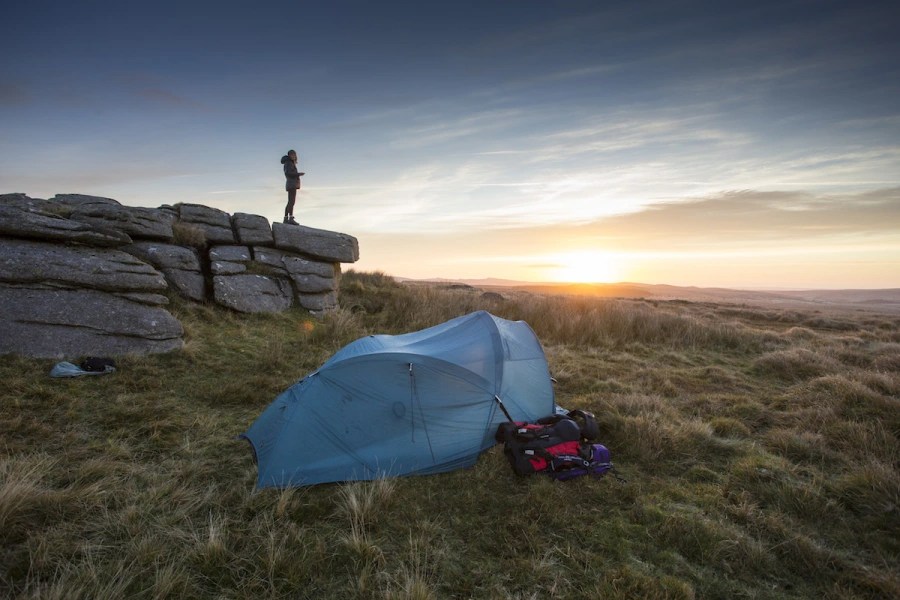Access and environmental organisations have announced their intentions to fight back after the high court ruled in favour of a wealthy landowner and revoked wild camping rights on Dartmoor.
Right to Roam announced they were going “to war” for “our right to sleep under the stars”, the British Mountaineering Council (BMC) said they would “work with like-minded organisations to try to overturn this result” on wild camping, while figures from the Labour Party announced said the party would expand the right to roam if elected to government.
The decision by the high court effectively means that wild camping is not officially legal on Dartmoor without landowner’s permission, which is the case in the rest of England and Wales. Wild camping was previously considered to be legal under the Dartmoor Commons Act 1985, the only place in the UK outside Scotland where this was the case.
Main image: wild camping on Dartmoor | Photo: Hanna Lindon
The case was brought against the Dartmoor National Park Authority (DNPA) by Alexander Darwall, a hedge fund manager and one of Dartmoor’s biggest landowners, whose lawyers argued that the 1985 act did not include camping overnight, as it did not explicitly mention it. The judge Julian Flaux ruled that this was correct, a decision which hinged on whether wild camping counted as one of the ‘recreational activities’ included in the act.
“War”
The Right to Roam campaign, which campaigns to expand the Countryside and Rights of Way Act in England, announced that it was organising a protest march over Darwall’s land on January 21st.
The campaign announced on Twitter: “Right to Roam goes to war. Today’s decision by the High Court to revoke the right to wild camp in Dartmoor – the only place in England it was legal – is an absolute outrage. Today Right to Roam launch a ferocious campaign to fight for our right to sleep under the stars.”
Dr Catherine Flitcroft, Access and Conservation Officer for the BMC, said: “It’s a huge blow for the outdoors and the BMC is very disappointed – a wild camp in the mountains and hills, miles from anywhere, is one of the great wilderness experiences.
“At a time when access to nature is so important for our mental and physical wellbeing, this is yet another decision which will have a huge negative impact on the public’s image of our beautiful landscapes being a welcoming place for all.
“The BMC will support the national park, help defend our rights of access, and work alongside other like-minded organisations to try to overturn this result.”
Retrograde step
The Ramblers said the decision was a “significant retrograde step” and warned the case could be “the thin end of the wedge for people’s rights to explore nature.”
James MacColl, Head of Policy, Advocacy and Campaigns, said: “This is a disappointing result which restricts access on Dartmoor and undermines people’s rights to explore nature. We support the National Park Authority in defending the right to wild camp on Dartmoor, and separately, we will continue campaigning to expand open access, bringing nature closer to where people live and making it more equal for everyone to access”
The decision was also condemned by several politicians. Labour Jim Mcmahon, MP for Oldham West and Royton, said on Twitter: “This is a backward step at a time when we should be widening access to nature, embracing our national parks for all, and putting our collective interest above narrow interest.”
Alex Sobel, Labour MP for Leeds North West, said: “Our National Parks should be open to all and access to Dartmoor is integral to that. Labour will expand the right to roam as part of our programme for Government. Our natural spaces are here for us all to share for biodiversity, wellbeing and equity.”
Caroline Lucas, Green MP for Brighton Pavillion, said: “Dartmoor ruling marks one landowner’s naked attempt to roll back access to natural parks. We have legal access to just 8% of English land, 3% of rivers and no wild camping at all – yet Scotland’s had wild camping and roaming successfully for years. We need the Right to Roam.”
Wild camping is permitted in Scotland under the terms of the Scottish Outdoor Access Code.
“Disappointed”
Dr Kevin Bishop, Chief Executive/National Park Officer for Dartmoor National Park Authority, said: “We are really disappointed with the outcome but obviously respect the judgment. We will now consider our position carefully before deciding on whether to appeal, and on what grounds.
“In the meantime, we will amend our website and other information we provide to people who are planning to wild camp on Dartmoor.
“We are keen to work with landowners and other stakeholders to see how we can sustain opportunities for people to wild camp on Dartmoor. We’re meeting with Dartmoor Common Owners’ Association in coming days and hope to ensure that, with the agreement of landowners, the opportunity to wild camp as it existed prior to this judgment is secured going forward.
“We maintain that wild camping is an important form of open-air recreation and is a way to enjoy the special qualities of the National Park – for example, the dark night skies, sense of wilderness and the tranquillity that can be derived from the commons of Dartmoor. Done properly, and with respect, it has little impact on the environment but can have significant health and wellbeing benefits.”







